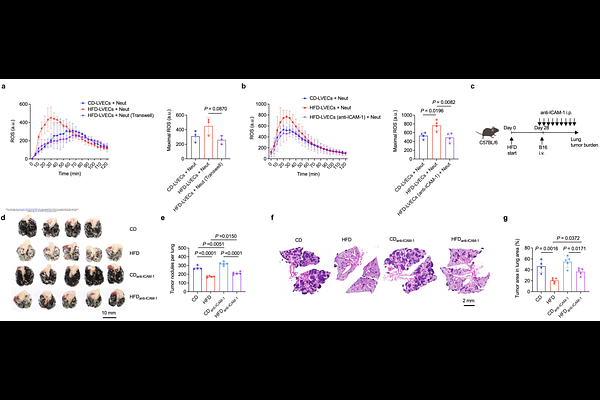Fat-rich diet reprograms intrapulmonary neutrophils to boost tissue-specific antitumor immunity

Fat-rich diet reprograms intrapulmonary neutrophils to boost tissue-specific antitumor immunity
Wang, Y.; Zhang, J.; Li, Y.; Wang, T.; Wang, L.; Miao, Y.; Chang, C.-W.; Liu, Y.; Huang, Z.; Yao, Z.; Xu, H.; Zhou, Q. D.; Wang, L.; Yao, Y.
AbstractNeutrophils adapt to tissue-specific signals and exert innate defense functions against infections and malignancies. Fat-rich diet (FRD), such as high-fat diet (HFD) and ketogenic diet (KD), has complex impacts on immunity. However, whether and how FRD shapes tissue-specific functions of neutrophils remain unclear. Here we show that both isocaloric HFD- and KD-fed mice demonstrate enhanced neutrophil-mediated pulmonary tumor resistance than chow diet-fed mice. Intrapulmonary but not systemic neutrophils in FRD-fed mice bear enhanced potential of reactive oxygen species (ROS) production and ROS-dependent tumor cytotoxicity. Mechanistically, FRD-induced increased serum saturated fatty acids and cholesterol stimulate lung vascular endothelial cells (LVECs), which reprogram intrapulmonary neutrophils via contact- and intercellular adhesion molecule-1 (ICAM-1)-dependent mechanisms. Analysis on human lung single-cell RNA sequencing data showed that intensified cell adhesion and priming signals from human LVECs are associated with enhanced antitumor functions in intrapulmonary neutrophils. Our findings highlight the roles of dietary fats in shaping neutrophil functions in a tissue-specific manner. Dietary intervention targeting tissue-specific reprogramming of neutrophils therefore represents a potential strategy against malignancies in the lungs.